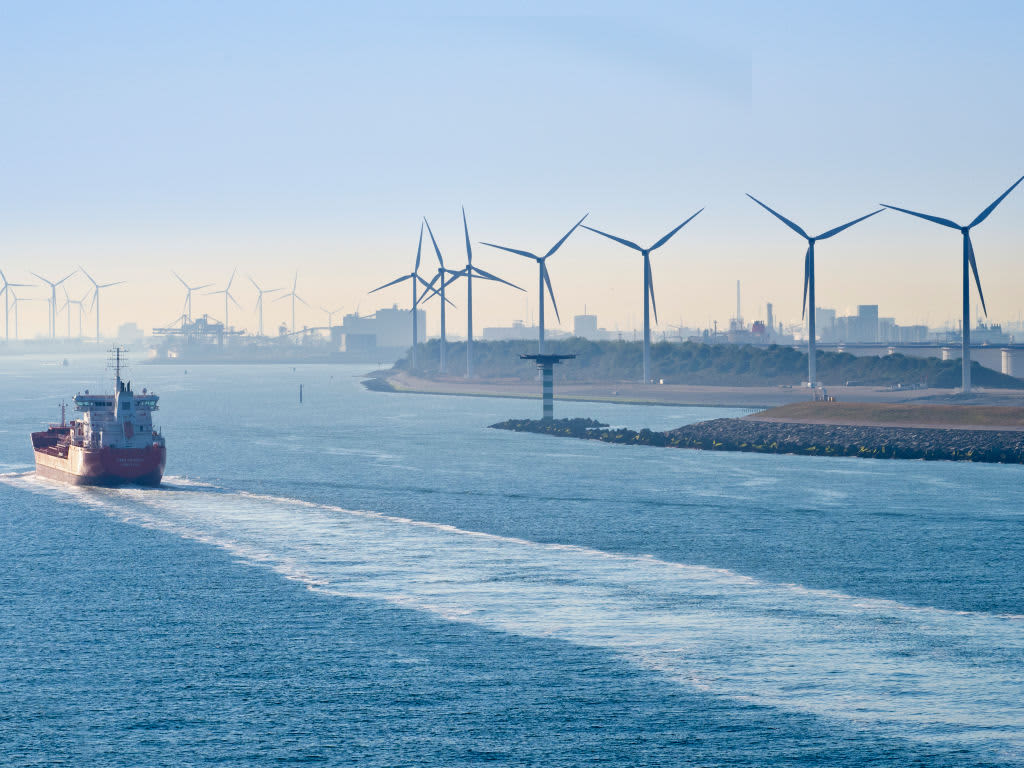- Described at the time as the ‘biggest change in the history of the oil market’, the International Maritime Organization (IMO) imposed new standards on January 1, 2020 to reduce the sulfur content of their fuels from 3.5% to 0.5%.
- The rule change resulted in an 80% reduction in sulfur dioxide emissions, a team of scientists said in a recent paper, and may help explain why last year’s record-breaking heat was so extreme.
- Tianle Yuan, a research scientist at the University of Maryland and lead author of the study, said via social media that the impact of clean air regulations could be described as “an unintended geoengineering event.”
Countries signed an agreement at the United Nations International Maritime Organization meeting in London to reach zero emissions from shipping ‘by or around’ 2050.
UCG | Universal Image Group | Getty Images
A major regulatory change in 2020 to reduce the world’s air pollution from ships could have played a role in raising global average temperatures, according to the findings of a controversial study.
Described at the time as the ‘biggest change in the history of the oil market’, the International Maritime Organization (IMO) imposed new standards on January 1, 2020 to reduce the sulfur content of their fuels from 3.5% to 0.5%.
The rule change resulted in an 80% reduction in sulfur dioxide emissions, a team of scientists said in an article published by the journal Communications Earth & Environment on May 30, and may help explain why last year’s record-breaking heat was so was extreme.
Tianle Yuan, a research scientist at the University of Maryland and lead author of the study, said via social media that the impact of clean air regulations could be described as “an unintended geoengineering event.”
That’s because sulfur dioxide, a pollutant created when sulfur-containing fuel such as coal or petroleum is burned, reacts with water vapor to produce aerosols that reflect sunlight back into space.
The aerosols have a direct cooling effect, although climate scientists note that their contribution to global cooling or warming, when reduced, remains a complex area of research.
Describing this as accidental geoengineering and presenting figures that could overestimate the consequences could lead to misplaced assumptions about policies intended to curb future emissions.
Laura Wilcox
Associate Professor at the National Center for Atmospheric Science at the University of Reading
According to the study, the precipitous drop in sulfur emissions since 2020 supports the viability of marine cloud brightening, a growing area of scientific interest that some researchers say could be used to help cool the planet.
The question of whether reductions in sulfur dioxide emissions may have contributed to global warming is not new to climate scientists, but the debate has recently reignited following extreme heat waves in the North Atlantic Ocean and in many parts of Europe.
Extreme temperatures are fueled by the climate crisis, the main cause of which is the burning of fossil fuels.
“There are three interesting things people are trying to pinpoint as to why 2023 was so alarmingly warm and the first one that everyone has heard about is El Nino,” Jim Haywood, professor of atmospheric sciences at Britain’s University of Exeter, told CNBC. by phone.
“The second is what people are not so aware of: Hunga Tonga, an explosive volcanic eruption that was very unusual… And the third is the IMO shipping regulations,” Haywood said.
According to the UN weather agency, the El Nino weather phenomenon, a naturally occurring climate pattern that has contributed to a spike in global temperatures, has been showing signs of ending recently. A return to the cooling influence of La Nina weather conditions is expected later this year.
Aerial top view container ship at full speed with beautiful wave pattern for logistics, import export, shipping or transportation.
Suriyapong Thongsawang | Moment | Getty Images
“You have such great climate scientists [former NASA scientist] Jim Hansen claims we’re not going to get a recovery and the temperature track isn’t going to get back into the pack – and I think I share with him a little bit on this,” Haywood said.
“I think there are so many ways in which the interactions between aerosol clouds can be underestimated in the climate models that this could have had an accelerating impact,” he added.
“It’s very difficult to quantify exactly how much. All climate models will give you slightly different answers because of the way they do their sulfur dioxide emissions,” Haywood said. “So we are uncertain about how much impact the IMO rules will have had on global average temperatures.”
Scientists, who were not involved in the article, broadly welcomed the research as timely, but some said the research could exaggerate the impact of the IMO regulations.
Joel Hirschi, head of marine systems modeling at the UK’s National Oceanography Centre, said the research shows that reductions in sulfur in marine fuel since 2020 have likely accelerated planetary warming.
However, Hirschi said the authors likely overestimated the impact that reducing sulfur in marine fuel had on record-breaking global temperatures last year and in 2024.
“The record high temperatures we witnessed in 2023 and 2024 are remarkable and cannot be explained by any single factor. Research is underway into why recent temperatures have been so high and reduced sulfur content in marine fuel is just one contributing factor. Hirschi said.
In addition, Laura Wilcox, associate professor at the National Center for Atmospheric Science at Britain’s University of Reading, said the study “makes very bold claims about temperature changes and geoengineering, which seem difficult to justify on the evidence.”
“For many people, a shift to a lower sulfur marine fuel that causes less air pollution and reduces aerosol emissions is a step away from man-made climate impacts, as well as a step that reduces the health impacts of air pollution ” says Wilcox. said.
“Describing this as accidental geoengineering and presenting figures that may overestimate the impacts could lead to misplaced assumptions about policies intended to curb future emissions,” she added.
